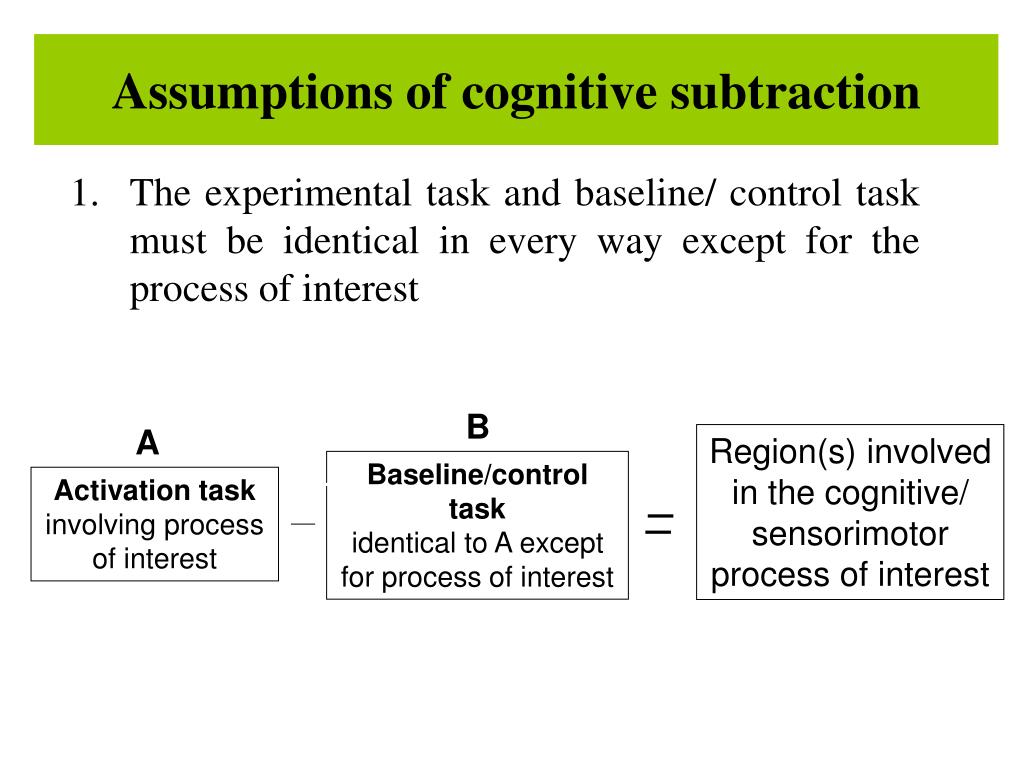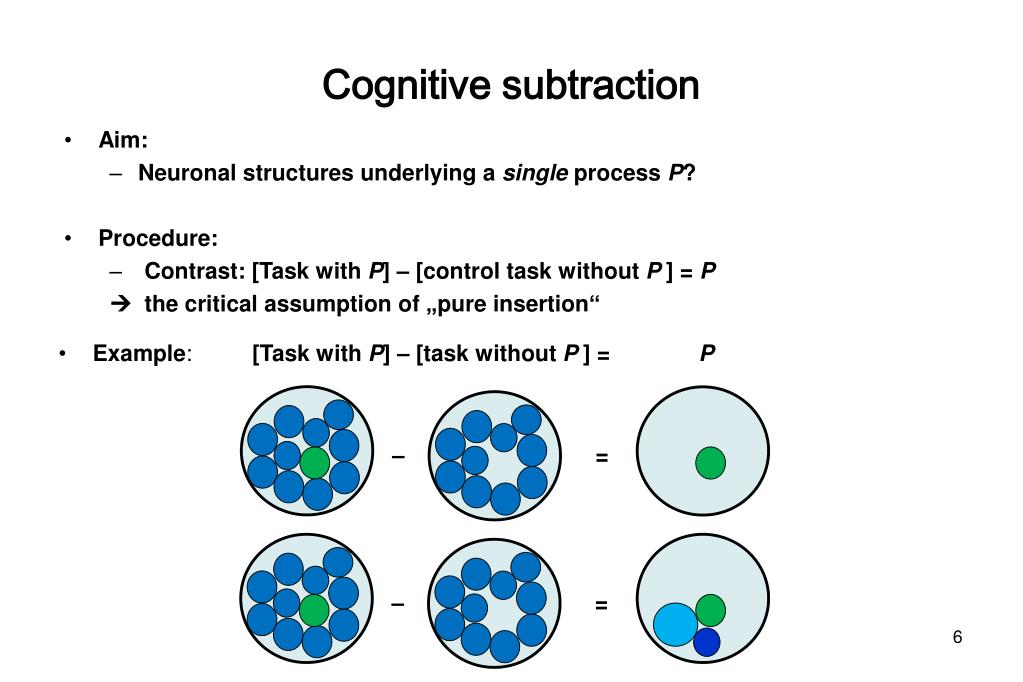Cognitive Subtraction
Cognitive Subtraction - In this paper we present a critique of pure insertion. Functional neuroanatomy of cognitive processes is generally derived by subtraction of a control task from an experimental task. In cognitive subtraction, the area of activation is identified by subtracting one task from another, whereas in cognitive conjunction an area of. Functional neuroanatomy of cognitive processes is generally derived by subtraction of a control task from an.
Functional neuroanatomy of cognitive processes is generally derived by subtraction of a control task from an experimental task. In this paper we present a critique of pure insertion. In cognitive subtraction, the area of activation is identified by subtracting one task from another, whereas in cognitive conjunction an area of. Functional neuroanatomy of cognitive processes is generally derived by subtraction of a control task from an.
In this paper we present a critique of pure insertion. Functional neuroanatomy of cognitive processes is generally derived by subtraction of a control task from an experimental task. In cognitive subtraction, the area of activation is identified by subtracting one task from another, whereas in cognitive conjunction an area of. Functional neuroanatomy of cognitive processes is generally derived by subtraction of a control task from an.
PPT Contrast and Inferences PowerPoint Presentation, free download
Functional neuroanatomy of cognitive processes is generally derived by subtraction of a control task from an. In this paper we present a critique of pure insertion. Functional neuroanatomy of cognitive processes is generally derived by subtraction of a control task from an experimental task. In cognitive subtraction, the area of activation is identified by subtracting one task from another, whereas.
PPT Experimental design of fMRI studies PowerPoint Presentation, free
Functional neuroanatomy of cognitive processes is generally derived by subtraction of a control task from an experimental task. In cognitive subtraction, the area of activation is identified by subtracting one task from another, whereas in cognitive conjunction an area of. In this paper we present a critique of pure insertion. Functional neuroanatomy of cognitive processes is generally derived by subtraction.
3 Cognitive Subtraction example 2 when the robot has only modeled a
In this paper we present a critique of pure insertion. Functional neuroanatomy of cognitive processes is generally derived by subtraction of a control task from an. In cognitive subtraction, the area of activation is identified by subtracting one task from another, whereas in cognitive conjunction an area of. Functional neuroanatomy of cognitive processes is generally derived by subtraction of a.
Cognitive subtraction ''foreign language (a) minus native language
Functional neuroanatomy of cognitive processes is generally derived by subtraction of a control task from an experimental task. In cognitive subtraction, the area of activation is identified by subtracting one task from another, whereas in cognitive conjunction an area of. Functional neuroanatomy of cognitive processes is generally derived by subtraction of a control task from an. In this paper we.
2 Cognitive Subtraction example 1 in the presence of considerable
In this paper we present a critique of pure insertion. Functional neuroanatomy of cognitive processes is generally derived by subtraction of a control task from an experimental task. In cognitive subtraction, the area of activation is identified by subtracting one task from another, whereas in cognitive conjunction an area of. Functional neuroanatomy of cognitive processes is generally derived by subtraction.
5 Cognitive Subtraction example 4 On the other hand, when the initial
Functional neuroanatomy of cognitive processes is generally derived by subtraction of a control task from an. Functional neuroanatomy of cognitive processes is generally derived by subtraction of a control task from an experimental task. In cognitive subtraction, the area of activation is identified by subtracting one task from another, whereas in cognitive conjunction an area of. In this paper we.
4 Cognitive Subtraction example 3 the annealed particle filter used
Functional neuroanatomy of cognitive processes is generally derived by subtraction of a control task from an. In cognitive subtraction, the area of activation is identified by subtracting one task from another, whereas in cognitive conjunction an area of. In this paper we present a critique of pure insertion. Functional neuroanatomy of cognitive processes is generally derived by subtraction of a.
Cognitive subtraction YouTube
Functional neuroanatomy of cognitive processes is generally derived by subtraction of a control task from an. Functional neuroanatomy of cognitive processes is generally derived by subtraction of a control task from an experimental task. In this paper we present a critique of pure insertion. In cognitive subtraction, the area of activation is identified by subtracting one task from another, whereas.
7/10/2014 Yingying. MRI studies brain anatomy. Functional MRI (fMRI
In this paper we present a critique of pure insertion. Functional neuroanatomy of cognitive processes is generally derived by subtraction of a control task from an experimental task. Functional neuroanatomy of cognitive processes is generally derived by subtraction of a control task from an. In cognitive subtraction, the area of activation is identified by subtracting one task from another, whereas.
Cognitive Development Subtraction YouTube
In cognitive subtraction, the area of activation is identified by subtracting one task from another, whereas in cognitive conjunction an area of. Functional neuroanatomy of cognitive processes is generally derived by subtraction of a control task from an. Functional neuroanatomy of cognitive processes is generally derived by subtraction of a control task from an experimental task. In this paper we.
Functional Neuroanatomy Of Cognitive Processes Is Generally Derived By Subtraction Of A Control Task From An.
In cognitive subtraction, the area of activation is identified by subtracting one task from another, whereas in cognitive conjunction an area of. In this paper we present a critique of pure insertion. Functional neuroanatomy of cognitive processes is generally derived by subtraction of a control task from an experimental task.









